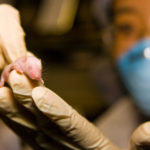
Cross-species links identified for osteoarthritis
New research from the University of Liverpool, published today in NPJ Systems Biology and Applications, has identified cell messages that could help identify the early stages of osteoarthritis (University of Liverpool, 2017). Osteoarthritis (OA) is the destruction of the tissues of the joints and affects more than half of people aged over sixty five. It … Continue reading Cross-species links identified for osteoarthritis

New understanding of the silent changes in genes that cause cystic fibrosis
Researchers studying the root cause of cystic fibrosis have made a major advance in the understanding of silent gene changes with implications for the complexity of cystic fibrosis (University of Bristol, 2017). Cystic fibrosis is a common life-shortening inherited disease that affects over 70,000 people worldwide, the majority of whom are children and young adults. … Continue reading New understanding of the silent changes in genes that cause cystic fibrosis

Mice with 3D printed ovaries give birth
3D printed ovaries made of gelatine have allowed mice to conceive and give birth to healthy pups (Science, 2017). Engineered ovaries like these could one day be used to help restore fertility in cancer survivors rendered sterile by radiation or chemotherapy. This “landmark study” is a “significant advance in the application of bioengineering to reproductive … Continue reading Mice with 3D printed ovaries give birth

Snail genome discovery could help combat schistosomiasis
Scientists at Aberystwyth University have contributed to international efforts to characterise the genome of a snail species responsible for passing on a parasite that kills 200,000 people every year (Aberystwyth University, 2017). Researchers at Aberystwyth University’s Barrett Centre for Helminth Control (BCHC) at the Institute of Biological, Environmental and Rural Sciences have been studying the … Continue reading Snail genome discovery could help combat schistosomiasis

Research suggests a new approach to detecting and monitoring inflammatory bowel disease
A University of Manchester test on the mucus lining of the intestine, performed in mice, has found changes in bacteria that could lead to inflammatory bowel disease twelve weeks earlier than previously possible through looking at stool samples (University of Manchester, 2017). The findings, published in Inflammatory Bowel Disease, could lead to the possibility of … Continue reading Research suggests a new approach to detecting and monitoring inflammatory bowel disease

New “transformational” test for rare childhood genetic disorders
The way doctors diagnose a group of rare genetic disorders in children could be transformed by a new test developed by University of Manchester researchers (University of Manchester, 2017). Inborn errors of metabolism (IEMs) are rare inherited conditions where enzymes that break down toxins or serve other essential functions in the body are missing. There … Continue reading New “transformational” test for rare childhood genetic disorders

New eye drops developed to treat age-related macular degeneration
Scientists at the University of Birmingham have developed a type of eye drop which could potentially revolutionise the treatment of age-related macular degeneration (AMD) (University of Birmingham, 2017). The results of the collaborative research, published in Investigative Ophthalmology and Visual Science, could spell the end of painful injections directly into the eye to treat AMD. … Continue reading New eye drops developed to treat age-related macular degeneration

Epilepsy drugs could be improved with new targeted approach
New research from the University of Liverpool, in collaboration with the Mario Negri Institute in Milan, published today in the Journal of Clinical Investigation, has identified a protein that could help patients with epilepsy respond more positively to drug therapies (University of Liverpool, 2017). Epilepsy continues to be a serious health problem and is the … Continue reading Epilepsy drugs could be improved with new targeted approach

Cardiff University receives funding for research to prevent bowel cancer
Lyndon Wood, one of the UK’s most successful entrepreneurs, is helping to fund new research into the prevention of bowel cancer (Cardiff University, 2017). The innovative research, which focuses on the link between diet and cancer, is taking place at the European Cancer Stem Cell Research Institute, one of Cardiff University’s flagship research centres. Established … Continue reading Cardiff University receives funding for research to prevent bowel cancer

Stem cell transplants to help treat Huntington’s disease
Cardiff University has announced plans to conduct a stem cell transplantation procedure that could benefit people affected by Huntington’s disease in Wales (Cardiff University, 2017). The Brain Repair and Intracranial Neurotherapeutics (BRAIN) Unit kicked off Huntington’s Disease Awareness Week (May 15th – 21st) by unveiling its intention to perform the first of its pioneering procedures … Continue reading Stem cell transplants to help treat Huntington’s disease








